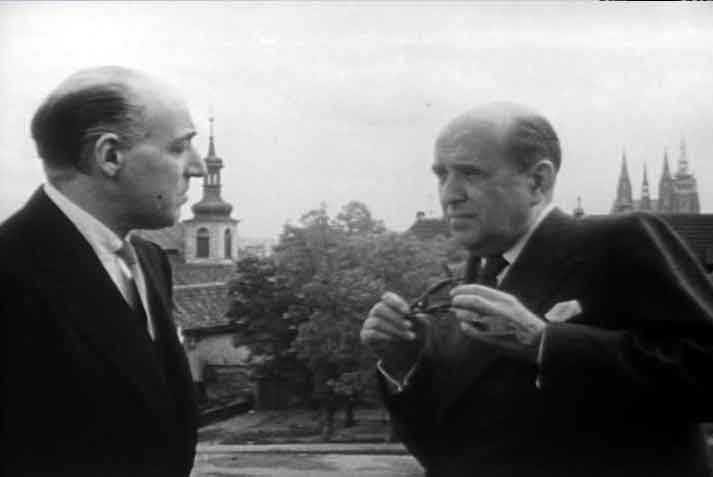Communist Seize Full Control over Czechoslovakia

Massarak with US Ambassador
Czechoslovakia was governed by a coaltion government that included the Communist Party. In January 1948, when members of other parties resigned the government to protest the placing of Communists in the police, the Communists used the opportunity to take full control of the government.
With the end of World War II, a new Czech government came into existence when a government called the National Front Coalition, made up of the three main socialist parties, began governing..
The Communists in Czechoslovakia had every reason to think that they could be an important if not dominant force in Czech politics. In the last election before the war, the Communist Party in 1935 had garnered 10% of the vote. In elections in May 1946, the Communists received over 40% of the vote in the Czech part of the country while not doing as well in the Slovak parts of the country. As a result, the Communist Party became part of the government, controlling essential ministries such as the Interior Ministry that gave it control of the police. Edvard Beneš, the beloved wartime leader, remained the President, and Jan Massarak the son of the founder of modern Czechoslovakia, was the Foreign Minister.
In the meantime, the Communists recruited more and more members to the Party. In 1945 there were only 50,000 members of the Party in Czechoslovakia. By January 1948, the Party in a country of 12 million had a membership of 1,310,000.
The Party initially supported Czechoslovakia, receiving aid as part of the Marshal Plan. The country's President was the popular wartime President Benes, and the Foreign Minister was the son of the country's founder, Jan Masaryk. However, when Stalin objected to Czechoslovakia receiving aid under the Marshall Plan, they went along and declined the assistance.
Communists were slowly taking control of the police, and the non-communist members of the government objected. In what turned out to be a fatal move for Czech democracy, they resigned in protest, hoping to force new elections. Unfortunately, they had not coordinated their action with Benes, and no new elections were called. Instead, the communists took over the ministries that the non-communists had held.
Benes soon resigned, and Masaryk died under questionable circumstances. The Communists successfully gained control of the country in a quiet coup. Their actions served as a warning to other countries like Finland that were trying to maintain neutrality.
 >
>